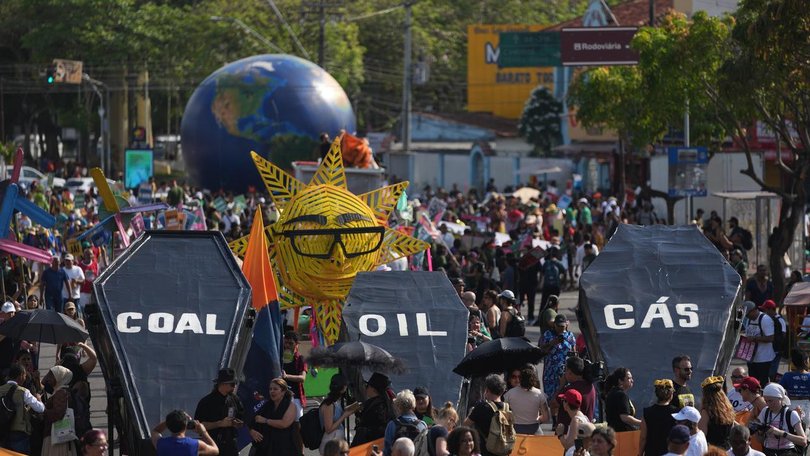Brazil: Thousands of climate protesters march on UN climate talks in Belem
Demonstrators are marching in Belem, Brazil, at the halfway point of United Nations climate talks.

Some wore black dresses to signify a funeral for fossil fuels, while hundreds wore red shirts, symbolising the blood of those fighting to protect the environment.
Saturday was the biggest day of protest at the halfway point of the United Nations climate talks being held in Belem, Brazil.
Organisers with booming sound systems on trucks with raised platforms directed protesters from a wide range of environmental and social movements.
Sign up to The Nightly's newsletters.
Get the first look at the digital newspaper, curated daily stories and breaking headlines delivered to your inbox.
By continuing you agree to our Terms and Privacy Policy.Marisol Garcia, a Kichwa woman from Peru marching at the head of one group, said protesters are there to put pressure on world leaders to make “more humanised decisions”.
The demonstrators planned to walk about four kilometres on a route that will take them near the main venue for the talks, known as COP30.
Protesters earlier this week twice disrupted the talks by surrounding the venue, including an incident on Tuesday where two security guards suffered minor injuries.
Many of the protesters revelled in a freedom to demonstrate more openly than at recent climate talks held in more authoritarian countries, including Azerbaijan, the United Arab Emirates and Egypt.
Youth leader Ana Heloisa Alves, 27, said it was the biggest climate march she has been part of.
“This is incredible,” she said.
“You can’t ignore all these people.”
Alves was at the march to fight for the Tapajos River, which the Brazilian government wants to develop commercially.
“The river is for the people,” her group’s signs read.
Pablo Neri, coordinator in the Brazilian state of Pará for the Movimento dos Trabajadores Rurais Sem Terra, an organisation for rural workers, said organisers of the talks should involve more people to reflect a climate movement that is shifting toward popular participation.
The United States, where President Donald Trump has ridiculed climate change as a scam and withdrawn from the landmark 2015 Paris Agreement that sought to limit the earth’s warming, is skipping the talks.
One demonstrator, Flavio Pinto of Pará state, took aim at the US.
Wearing a brown suit and an oversized American flag top hat, he shifted his weight back and forth on stilts and fanned himself with fake hundred-dollar bills with Trump’s face on them.
“Imperialism produces wars and environmental crises,” his sign read.
The marchers formed a sea of red, white and green flags as they progressed up a hill.
A crowd of onlookers gathered outside a corner supermarket to watch them approach, leaning over a railing and taking mobile phone photos.
“Beautiful,” said a man passing by, carrying grocery bags.
The climate talks are scheduled to run until Friday.
Analysts and some participants have said they don’t expect any major new agreements to emerge from the talks, but are hoping for progress on some past promises, including money to help poor countries adapt to climate change.
